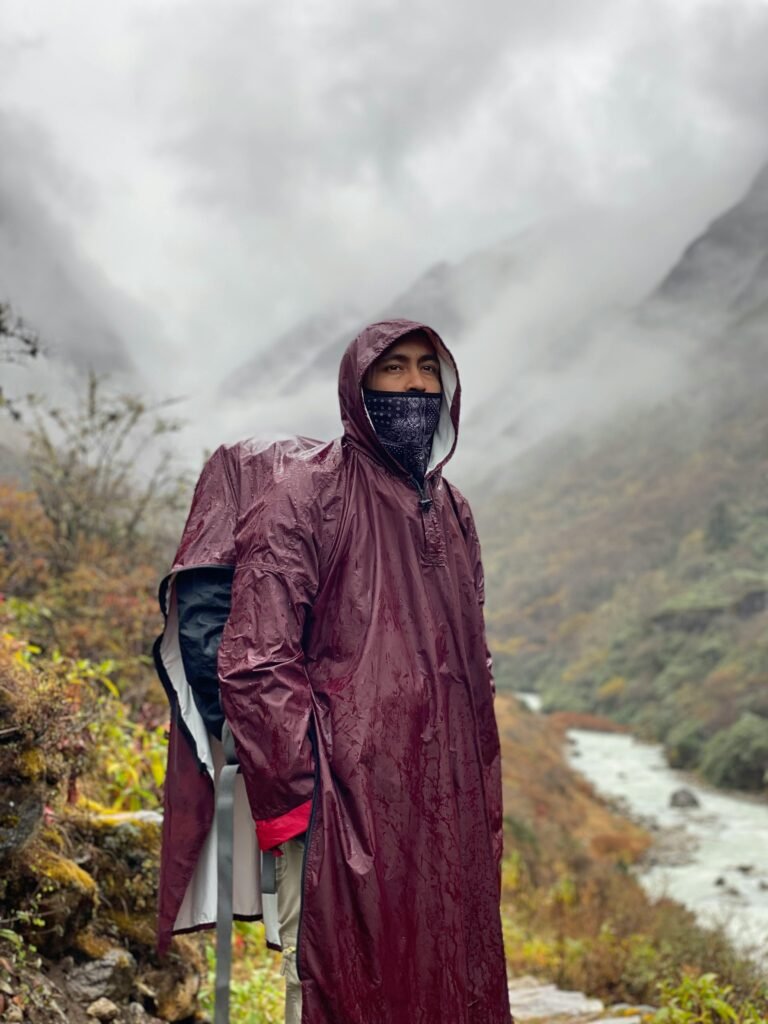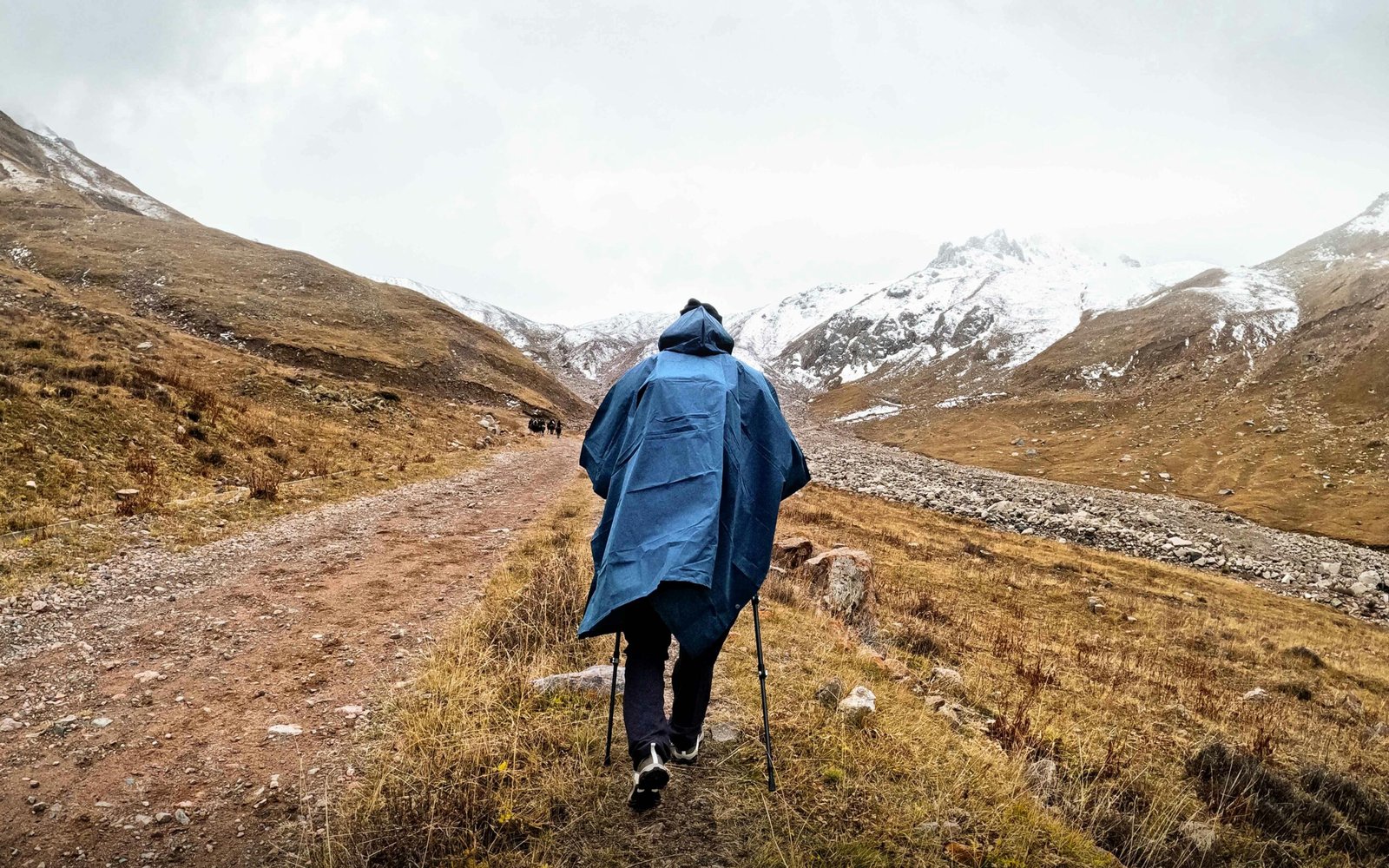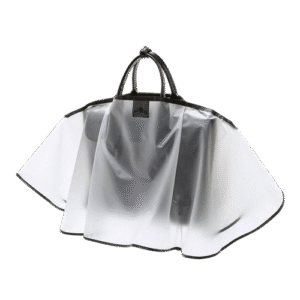يصف هذا المقال معطف حقائب الظهر المستخدم في التخييم أو التنزه في الهواء الطلق، ومتى يتم استخدامه؟ كيف تختار المعطف المناسب لحقائب الظهر؟ ما هي مزاياها على سترة المطر؟ نحن شركة تصنيع ملابس المطر في الصين مع أكثر من 10 سنوات من الخبرة، نعتقد أننا سنقدم لك بعض الاقتراحات المرجعية.
ما هي عباءة حقائب الظهر؟

حرفياً عباءة حقائب الظهر هو نوع من معدات المطر المصممة خصيصاً للرحالة. وهو في الأساس عبارة عن عباءة مطر ممتدة، ولكن مع نقطة تصميم خاصة: سيتم توسيع الجزء الخلفي وتوسيعه، أو سيأتي مع مساحة توسعة منفصلة، والتي يمكن أن تغطي حقيبة الظهر بأكملها، ويمكن للجزء الممتد أن يغطي الساقين جيدًا أيضًا.
مزايا ومساوئ عباءة المطر على الظهر
تخيل أنه إذا تم ارتداء معطف المطر العادي على الجسم، فسيتم وضع المعطف على الظهر بواسطة حقيبة التنزه، وحقيبة السفر، وسيتدفق المطر إلى أسفل الحقيبة إلى ظهرك، أو مباشرة إلى أسفل المعطف المبلل مباشرة.
يحل معطف حقائب الظهر هذه المشكلة، وهذه هي ميزته الفريدة:
تغطية كبيرة جداً: الجزء الخلفي مصنوع بشكل عريض وطويل، مثل الرداء الكبير، والذي يمكن أن يغطي بسهولة حقيبة الظهر الكبيرة على ظهرك (نصائح: اختر الطول والحجم المناسبين).
مقصورة حقيبة ظهر منفصلة: تحتوي العديد من الأنماط على فتحة في الجزء العلوي من الظهر مع رباط أو شريط فيلكرو للإغلاق. قبل أن ترتدي المعطف، يمكنك وضع حقيبة الظهر من خلال هذه الفتحة ووضعها على ظهرك، ثم شد الفتحة بحيث يتم لف حقيبة الظهر بإحكام داخل المعطف. هناك أيضاً حالات يتم فيها تغطية الظهر بالكامل مع حقيبة الظهر.
حماية لكامل الجسم: عباءة ذات غطاء للرأس، وياقة قابلة للتعديل، وأساور قابلة للتعديل، وطول يصل عادةً إلى الركبتين أو أقل، مما يحمي الجسم والساقين من البلل.
ملائم للتخزينيمكن طيها عادةً في حقيبة التخزين، وعندما يتحسن الطقس يمكن وضعها مباشرة في حقيبة الظهر.
العيوب
في الغابات أو في يوم عاصف، تميل الحاشية العريضة إلى التعلق أو تتطاير من الأغصان.
يصعب ارتداؤها وخلعها أكثر قليلاً من سترة المطر العادية، خاصةً تلك التي تحتوي على حجرة منفصلة لحقيبة الظهر.
إذا كانت حقيبة الظهر ضخمة بشكل خاص، فقد لا تغطيها بالكامل.
التطبيقات
المشي لمسافات طويلة وتسلق الجبال: هذا هو الاستخدام الأكثر شيوعًا، لحماية كيس النوم والملابس والطعام وما إلى ذلك في الحقيبة من البلل، وكذلك لحماية المتنزه.
ركوب (دراجة هوائية/دراجة كهربائية): لتغطية حقيبة الظهر أو السلة خلف الراكب.
العمل في الهواء الطلق: الأشخاص الذين يحتاجون إلى حمل عدة للعمل تحت المطر.
عباءات حقائب الظهر مقابل معاطف المطر
| المعلمات | عباءة حقائب الظهر | معطف واق من المطر |
|---|---|---|
| الوزن وقابلية التعبئة والتغليف | ||
| الوزن عادةً 150-300 جم (5.3-10.6 أونصة) | ✅ خفيف للغاية | ⚠️ أثقل (300-600 جم) بسبب السحابات/الطبقات |
| حجم العبوة كفاءة المساحة عند التخزين | ✅ تُطوى إلى حجم الكرة اللينة/بحجم قبضة اليد | ⚠️ أكبر حجماً (يتطلب مساحة أكبر في العبوة) |
| الحماية من الطقس | ||
| العزل المائي مقاومة دخول الماء | ⚠️ محدودة (الأرجل مكشوفة، والجوانب مكشوفة للمطر بفعل الرياح) | ✅ تغطية كاملة (تصنيف 20,000 مم فأكثر) |
| مقاومة الرياح الحماية من برودة الرياح الباردة | ⚠️ رديء (يتطاير في الرياح) | ✅ ممتازة (درزات محكمة الإغلاق، وملاءمة مريحة) |
| التهوية إدارة الرطوبة/العرق | ✅ تدفق هواء فائق (جوانب مفتوحة تمنع التكثيف) | ⚠️ محدودة (تتطلب سحّابات حفرة لتمرير الهواء) |
| الأداء الوظيفي | ||
| تغطية حقيبة الظهر حماية للعتاد | ✅ يغطي الحزمة + الجسم (لا حاجة لغطاء مطر إضافي) | ⚠️ يتطلب غطاء عبوة منفصل |
| التنقل حرية الحركة | ⚠️ مقيدة (عوائق على الأغصان، تحد من حركة الذراع) | ✅ مُحسَّن للمشي/التسلق (أكمام مفصلية) |
| مرونة متعددة الاستخدامات التطبيقات غير الممطرة | ✅ يمكن استخدامها كمأوى/قماش قماشي/قماش أرضي | ⚠️ استخدام واحد (حماية من المطر/الرياح فقط) |
| المتانة والتكلفة | ||
| قوة المواد مقاومة التآكل/التمزق | ⚠️ معتدلة (أقمشة رقيقة عرضة للتمزق) | ✅ عالية (تستخدم أقمشة مقواة مثل Robic® REGEN) |
| نطاق السعر التكلفة السوقية النموذجية | ✅ $20-$50 (budget-friendly) | ⚠️ $100-$300 (أقمشة صديقة للبيئة متميزة بتكلفة إضافية) |
اعتبارات الشراء
لقد بحثنا في حجم المبيعات المرتفع لعباءات حقائب الظهر في السوق، وخبرة مصمم العقد، ولخصنا بعض الاقتراحات الشرائية:
1. خفيفة الوزن: في ظروف أخرى مماثلة، يعتبر وزن المعطف اختبارًا مهمًا لتقليل حمل المشي لمسافات طويلة.



2- مقاوم للماء وقابل للتهوية:: إعطاء الأولوية لمعطف المطر المقاوم للماء والقابل للتنفس، في وقت طويل تحت الحركة، ستكون الحاجة إلى التهوية الجيدة خارج الماء.
3. الحجم:: يمكن أن يصل الطول إلى ما تحت الركبة، ويمكن لفه بشكل أفضل حول حقيبة الظهر (مثل حقيبة الظهر سعة 80 لتر أو أكبر)
4. الإكسسوارات:: حقيبة تخزين مقاومة للماء، يمكن طيها في حقيبة الظهر عند عدم استخدامها.
5. ما بعد البيع:: عادةً مع ضمان لمدة 1-3 سنوات، حاول اختيار المتجر الذي يقدم خدمة أفضل بعد البيع.
الملخص
بالنسبة لعشاق المشي لمسافات طويلة، فإن معطف حقائب الظهر هو عنصر لا غنى عنه في الهواء الطلق، ونأمل أن تأخذك هذه المدونة إلى ماهية معطف حقائب الظهر وكيفية اختيار واحد.
نحن شركة تصنيع عباءات حقائب الظهر في الصين، إذا كنت من عشاق الهواء الطلق أو كنت تشتري معطفاً لرحلتك، فربما يمكننا تقديم بعض النصائح, مرحباً بك للاستفسار.





